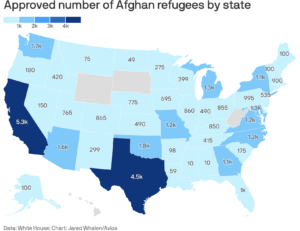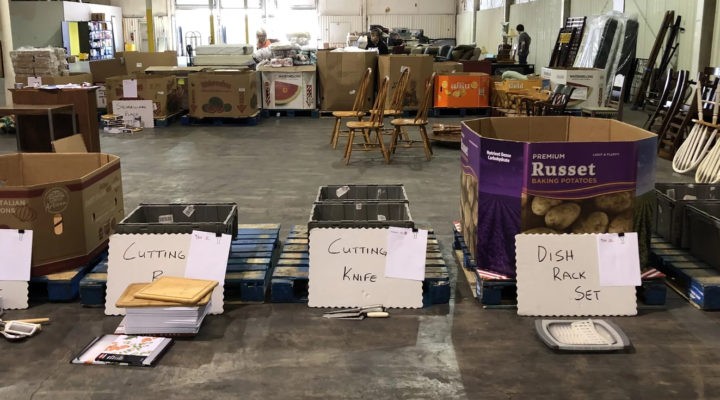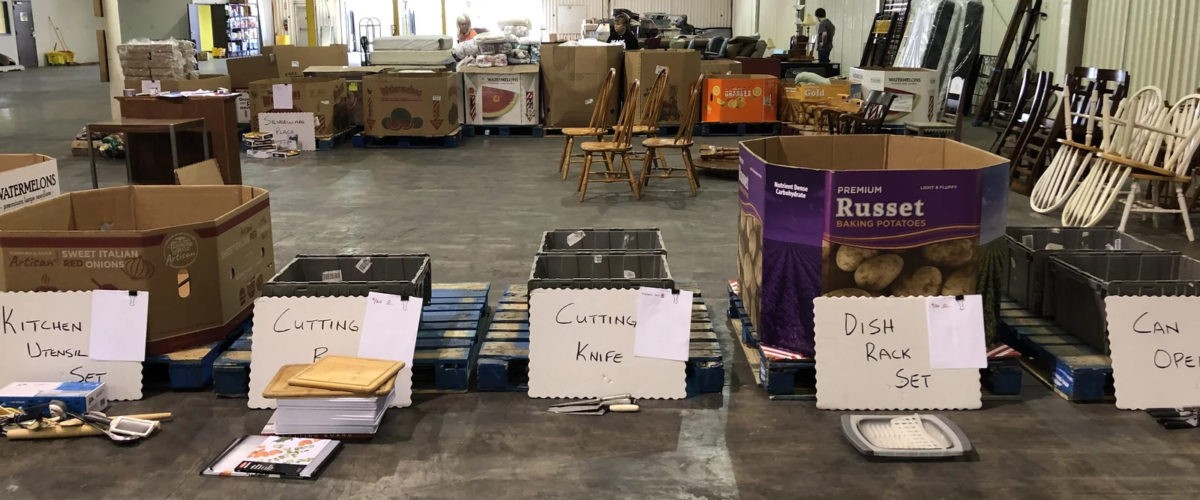The Cooperative Baptist Fellowship of Oklahoma will participate in an unfolding interfaith effort to welcome 1,800 Afghan evacuees expected to arrive in the Sooner state by the end of the year, Coordinator Kyle Tubbs said.
“We will absolutely be involved in meaningful and transformational ways, even though we are not sure what that will look like right now,” Tubbs said. “CBF Oklahoma wants to make sure that we are greeting these refugees as we would Jesus himself.”
 That welcoming posture has been echoed by Oklahomans of Christian, Muslim and other faiths since word arrived last month the state will host the third-largest resettlement of refugees evacuated by the U.S. from Afghanistan. Only California, with 5,255, and Texas, with 4,481, are slated to receive more, according to an analysis of Afghan resettlement by Axios.
That welcoming posture has been echoed by Oklahomans of Christian, Muslim and other faiths since word arrived last month the state will host the third-largest resettlement of refugees evacuated by the U.S. from Afghanistan. Only California, with 5,255, and Texas, with 4,481, are slated to receive more, according to an analysis of Afghan resettlement by Axios.
Most of Oklahoma’s Republican politicians, including Gov. Kevin Stitt, have expressed a welcoming attitude toward the incoming refugees.
“Governor Stitt welcomes Afghans fleeing the terrorist Taliban regime to come to Oklahoma and live in the freedom we hold so dearly,” his spokeswoman told local media.
That posture matches national polling on the issue.
“Overall, roughly two-thirds — or more — support admitting certain groups of Afghans into the U.S., including those who worked with the U.S. government (74%), served in the U.S. allied Afghan special forces (73%), or who fear repression or persecution from the Taliban (65%),” according to an NPR-Ipsos survey.
However, among those not in favor of receiving the refugees is Oklahoma Republican Party Chairman John Bennett, who posted a Facebook video equating the refugees with Taliban fighters. Bennett, an Assemblies of God pastor, made national headlines in August when he used social media to compare COVID-19 vaccine mandates to the persecution of Jews in the Holocaust, even employing a Star of David as a graphic.
Of the current situation, he said: “Why would we allow the same enemy we have been fighting for 20 years in the war on terror onto American soil?” he said. “I encourage you to call and email the governor, call and email your legislators and tell them do not allow Afghan refugees into Oklahoma.”
But Bennett’s plea seems to be falling on deaf ears in a state where faith groups are lining up to welcome their future Afghan neighbors.
“I don’t know anyone personally who is opposed to immigration. Maybe I just don’t walk in those circles,” said Kristin McAtee, associate pastor at Spring Creek Baptist Church in Oklahoma City and a former associate coordinator for CBF Oklahoma.

Kristin McAtee, left, and Naw Wah Wah Paw, a Burmese refugee, on the day she became an American citizen.
McAtee said she is tapping into existing refugee ministry connections to prepare CBF churches and other allies for the Afghan arrivals and to ensure the newcomers feel comfortable and safe in their new setting.
“I became interested in working with refugees when I was at First Baptist Oklahoma City, where we had six refugee congregations meeting in our facility. We worked hard to connect people to refugees to build a relationship-based ministry,” she said. “I have had a 12-year relationship with a Karen family from Burma.”
Then as now, McAtee is leaning into her partnership with The Spero Project, a faith-based nonprofit refugee ministry, to connect friends, CBF and other churches with the training and resources needed to welcome the 1,000 Afghans expected in Oklahoma City by Dec. 1.
“I am deeply invested in the whole refugee situation, and I am always trying to get more people connected,” she said.
While Catholic Charities has been contracted by the U.S. government to resettle the Afghans during their first three months in Oklahoma, additional help will be needed for months and years to come, she added. “What we are looking at here is the need for long-term relationships. It’s about transportation to doctor’s visits and filling out forms, but ideally it’s also about establishing friendships.”
It also may be necessary to line up volunteer chaplains and counselors to help the refugees cope with the stresses they experienced narrowly escaping the Taliban, McAtee added. “No one yet has had the time to think about how we deal with the trauma these people are going to have. These Afghans are coming straight out of a war zone. A comment was made to me that we haven’t seen anything like this since Vietnam.”
“We haven’t seen anything like this since Vietnam.”
Even the refugees probably have not considered the emotional consequences of the experiences they have recently endured, she predicted. “It’s been chaotic for them. It’s been about survival. And once they have a home and the kids are in school and things kind of settle down, then all of a sudden the trauma is going to become a real issue and something needs to be done about that.”
Equally challenging for volunteers is ramping up to meet the influx not only of Afghans but of other refugees since the Biden administration increased the nation’s refugee cap from 62,500 to 125,000 for the current fiscal year, McAtee said. “We had a great infrastructure for refugees but we lost that capacity under the previous administration.”
For now, it will take a grassroots network of volunteers to come alongside their new neighbors.
“We are called to invest in people, and we are called to disciple, which means walking in relationship with refugees, getting to know another person and being their friend. It’s not about changing them but loving them, and that is God’s work — that’s what God does with us,” she said.
Related articles:
Broad support for helping Afghan refugees does not uniformly extend to all refugees
Supporting the influx of Afghan refugees is bringing divided Americans together
Long after the news cycle fades, Afghan refugees will still need our care | Opinion by Samira Izadi Page


